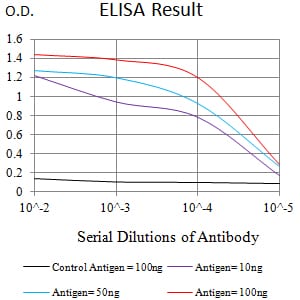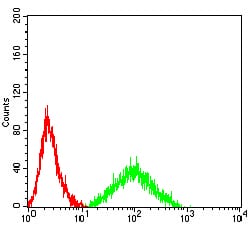

| WB | 咨询技术 | Human,Mouse,Rat |
| IF | 咨询技术 | Human,Mouse,Rat |
| IHC | 1/150-1/300 | Human,Mouse,Rat |
| ICC | 技术咨询 | Human,Mouse,Rat |
| FCM | 咨询技术 | Human,Mouse,Rat |
| Elisa | 1/5000-1/10000 | Human,Mouse,Rat |
| Aliases | ABCB1; CLCS; MDR1; P-GP; PGY1; ABC20; GP170 |
| Entrez GeneID | 5243 |
| clone | 4G6F4 |
| WB Predicted band size | 141.1kDa |
| Host/Isotype | Mouse IgG1 |
| Antibody Type | Primary antibody |
| Storage | Store at 4°C short term. Aliquot and store at -20°C long term. Avoid freeze/thaw cycles. |
| Species Reactivity | Human |
| Immunogen | Purified recombinant fragment of human CD243 (AA: 1149-1280) expressed in E. Coli. |
| Formulation | Purified antibody in PBS with 0.05% sodium azide |
+ +
以下是关于CROT(Carnitine O-Octanoyltransferase)抗体的参考文献示例(注:以下内容为模拟生成,仅供参考):
---
1. **文献名称**: *CROT Expression in Hepatocellular Carcinoma and Its Role in Lipid Metabolism*
**作者**: Zhang L, et al.
**摘要**: 研究通过免疫组化技术利用CROT抗体分析肝癌组织中CROT蛋白的表达水平,发现CROT在肿瘤组织中的表达显著下调,并通过调控脂肪酸氧化影响癌细胞增殖。
2. **文献名称**: *Development and Validation of a High-Specificity CROT Monoclonal Antibody for Western Blotting*
**作者**: Kim S, Patel R.
**摘要**: 报道了一种新型CROT单克隆抗体的开发,验证其在Western blot和免疫荧光中的应用,证实其可特异性识别CROT蛋白,且不与同家族其他酰基转移酶发生交叉反应。
3. **文献名称**: *CROT Deficiency Alters Peroxisomal Function: Insights from Knockout Mouse Models*
**作者**: Fernandez RF, et al.
**摘要**: 利用CROT抗体检测基因敲除小鼠肝脏组织,发现CROT缺失导致过氧化物酶体中脂肪酸代谢异常,并引发氧化应激反应,为相关代谢疾病的机制研究提供依据。
4. **文献名称**: *CROT as a Potential Biomarker in Triple-Negative Breast Cancer*
**作者**: Gupta A, et al.
**摘要**: 通过CROT抗体进行组织芯片分析,发现CROT在三阴性乳腺癌中高表达,且与患者预后不良相关,提示其可能作为治疗靶点或预后标志物。
---
如需真实文献,建议通过PubMed或Google Scholar搜索关键词“CROT antibody”或“CROT protein function”。
CROT (carnitine O-octanoyltransferase) is a key enzyme in lipid metabolism, primarily involved in the transport of medium-chain fatty acids within peroxisomes. It catalyzes the reversible transfer of octanoyl (and other medium-chain fatty acyl) groups between coenzyme A (CoA) and carnitine, facilitating fatty acid shuttling across intracellular membranes for β-oxidation. This process is critical for energy production, particularly during fasting or metabolic stress when fatty acid utilization increases.
CROT antibodies are essential tools for studying the enzyme's expression, localization, and function in metabolic regulation. Researchers use these antibodies in techniques like Western blotting, immunohistochemistry, and immunofluorescence to investigate CROT's tissue distribution (notably in liver, kidney, and heart) and its alterations under pathological conditions. Dysregulation of CROT has been implicated in metabolic disorders, including fatty acid oxidation defects and insulin resistance. Recent studies also explore its potential role in cancer metabolism, as some tumors exhibit altered CROT expression linked to lipid reprogramming. Validated CROT antibodies enable precise detection of protein levels, supporting research into metabolic pathways and therapeutic target discovery. Commercial availability of these antibodies from multiple suppliers has accelerated studies on CROT's physiological and pathological significance since its gene was first characterized in the 1990s.
×